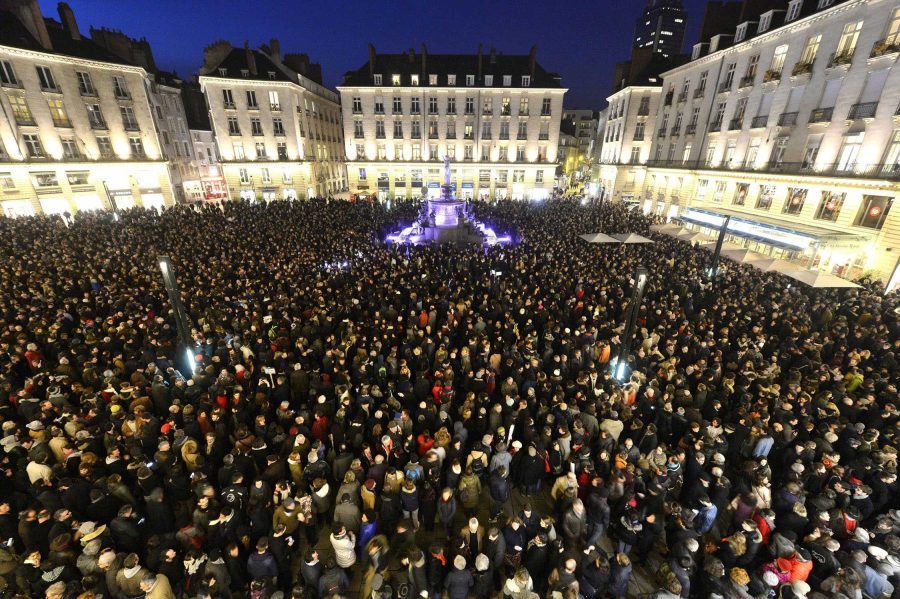Hypocritical double standards in free speech should end
(Franck Dubray/Zuma Press/TNS/MCT Campus)
Thousands gather at the Place Royale in Natnes, France, on Jan. 7 in a rally to pay tribute to those injured and killed in an attack on the French satirical magazine Charlie Hebdo. Though we must condemn the violent attacks, we should not use freedom of speech as justification to discriminate against others.
Feb 19, 2015
We live in a world of free speech and societal double standards. We respect offensive depictions of the prophet Muhammad, but we attack Jewish humor as anti-Semitic. We hold massive marches for murdered journalists, but we show minimal global outrage over terrorist attacks in Nigeria. What kind of hypocritical world do we inhabit? It’s a world where we say we work for peace and understanding when we often revert to discrimination and ignorance.
In the case of the Charlie Hebdo terrorist attacks last month, most of the world made it clear that terrorism will not be tolerated as retaliation against offensive speech. We fight offensive speech with speech itself, not violence. In Paris, the march of world leaders and millions of citizens to support the slain journalists was a beautiful sight to behold.
However, we cannot ignore the hypocrisy pervading the whole issue, which includes France’s swift reaction against free speech, Charlie Hebdo’s historical racial stigmatization, European governments’ decisions to allow Islamophobic speech to continue and the West’s self-centered approach to terrorism.
After worldwide calls to support free speech, the French government immediately began detaining people who exercised this right inappropriately in their eyes. According to CBS, 70 legal proceedings have been opened for “apology and threats of terrorist attacks” since the Charlie Hebdo attack, and 54 people have been arrested, including controversial French comedian Dieudonné M’bala M’bala.
This reaction by France is hypocritical because it is banning some of the same type of satirical, offensive and deeply irreverent speech used by Charlie Hebdo. According to CBS, Thomas Hughes, the executive director of Article 19, a London-based free speech advocacy group, said, “Of course, incitement to terrorism should be criminalized, but French law goes beyond that and effectively criminalizes opinions justifying terrorist acts without any likelihood or intent of such acts actually occurring. That violates international law.”
Another example of hypocrisy is France’s hate speech laws against Holocaust denial and anti-Semitism (attributed to historical events), and their law prohibiting the condoning of acts of terrorism. Yet there is no law that bans hate speech against Muslims or any other group of discriminated people. This approach establishes a dangerous double standard. Roy Gutterman, the director of the Newhouse School’s Tully Center for Free Speech at Syracuse University, said, “Which racial or religious epithet is worthy of prosecution and which are worthy of letting slide? It’s a real slippery slope, even if the stuff is hateful and offensive.”
The magazine Charlie Hebdo itself maintains a clear free speech double standard in regard to its incendiary cartoons. Even though many people have been saying that no person, religion or culture is off limits to its satire, recent history would prove them wrong. According to the Telegraph, the publication dismissed journalist Maurice Sinet in 2009 for suggesting that Jean Sarkozy, son of the French president, was converting to Judaism for financial reasons. He was tried for “inciting racial hatred” by linking financial success to being Jewish. If that type of humor is considered racial hatred, then the Muhammad cartoons should logically also be considered as such.
Charlie Hebdo’s spat with Sinet is not the only evidence of Europe censoring some types of free speech while allowing Muslims to endure repeated discrimination. According to BBC, French court injunction banned a Jesus-based clothing advert mimicking Leonardo’s Last Supper in 2005. The display was ruled “a gratuitous and aggressive act of intrusion on people’s innermost beliefs.” According to the Guardian, in another case that same year, the Dutch publication “Jyllands-Posten,” which also published Muhammad cartoons, said they would not publish anything to do with the Holocaust or Christ because it may cause “public discontent.”
In both cases, freedom of speech was ignored for the purpose of avoiding controversy and not insulting people’s values. Because they dealt with Christianity and the horrendous atrocities of World War II, freedom of speech did not apply. These examples show that France and other areas of Europe are willing to protect the majority from offense and discontent, but they are unwilling to show equal respect to their often discriminated Muslim population.
With Charlie Hebdo, their purpose with the cartoons does not appear to be satire, social commentary or entertainment but instead blatant, needless, provocative insult. Even though, according to BBC News, “The magazine is part of the French-language tradition of Bandes dessinées (drawn strips), some of which are provocative to a degree rarely seen in mainstream English-speaking media,” a few of Charlie Hebdo’s most offensive cartoons merit no place in a modern Western world that claims it strives for peace and an end to discrimination.
Even Olivier Cyran, a former employer of the magazine, argued that recently (especially since 9/11), the paper has often drifted into racist caricatures, admitting that “Islamophobic neurosis gradually took over.” This startling racist emphasis by Charlie Hebdo is not limited to the Islamic faith. For example, the publication has depicted the French justice minister, Christiane Taubira, who is black, as a monkey. So can we say that this repeated issue of racism is really about freedom of speech or even satire?
According to The Christian Post, Omid Safi, Duke University’s director of the Islamic Studies Center, said, “I do not see this [Charlie Hebdo’s cartoons] as pure political satire, but something more akin to racist bullying disguised as freedom of speech. We see a mockery of the most marginalized and disenfranchised community in France, who are marked as ‘other’ racially, religiously, and socioeconomically.”
This discrimination of non-Western cultures and religions is a historical issue that must be addressed. This racist bullying stems from our alarming trend as Western culture to find it necessary to insult other cultures and other religions and other people of the globe under the protective guise of free speech. We speak in a state of superiority and arrogance that boils down to plain ignorance and a complete disregard for the values of people different from ourselves.
To bolster my point, one can look at the comments on any online article where the author even hints that the cartoonists displayed poor judgment. There, one can encounter sickening words that barrage the opinions of the articles’ authors, the faith of Islam and the Middle East. People need to wake up in the 21st century and learn that not all Muslims are terrorists. We should counter the extremists who actively kill and the rare leaders who support them while leaving the faith alone, along with the millions of peaceful and reverent people who practice it.
When it comes down to it, it was needless to portray the Prophet to illustrate anything, whether it be free speech, terrorists’ barbarity or religion in government. We must remember that the negative in Islam is not embraced by everyone in the faith. Even though it is obvious that jihadism empowers terrorists, we as individuals ultimately choose to commit evil or commit good regardless of what influences us.
Even though the Charlie Hebdo attacks brought the world to a standstill on the issues of free speech and terrorism, we say we care so much about terrorism only because it affected us directly. That same week, the Nigerian terrorist group Boko Haram committed its most atrocious attack yet. They leveled the town of Baga, massacring at least 2000 people, many of whom were innocent women and children. Later that same week, they strapped explosives to a ten year-old girl, killing 19 people when the bombs exploded.
Yet we don’t see a worldwide response to these abhorrent and violent attacks. We don’t see hundreds of news articles or a top-trending Twitter hashtag. We don’t see outrage that so many lives were lost. We don’t see a march in mourning. However, when 17 French journalists are killed over “free speech,” as Yasmin Ahmed of MintPress said, “There is an international emotional reaction and the event becomes an international controversy.”
Here in the West we say that all lives matter and that all human life has value and that all cultures should be celebrated. However, when it’s Africans that are being killed instead of French journalists and when it’s Islam that is being stigmatized instead of Christianity, we accept it as part of the normal course of events. Only when it’s the other way around do we react with rage and tumult and unity and action.
Never should we use our cherished right of free speech as a shield to justify the needless, blatant and crude representations of other cultures. If we do not stand for hateful speech against blacks, Jews and homosexuals, then we should also not stand for speech that belittles the Islamic faith.
We in the West would do well to revisit some of our most sacred beliefs of equality and “doing unto others as we would have done unto ourselves.” Maybe it’s about time that we also learn some humbleness in regards to the rest of the world. Only then, when we finally choose to believe that we are no better than any other group of people in spirit can we ever begin to treat all racial groups, all social groups and all world nations as equals.
If we are to work against discrimination and hate in favor of equality and peace, we should work for the justice of all people. As part of the human race, we owe a degree of respect to our fellow human beings and the myriad of beliefs they cherish, even if they do not agree with our own values.










